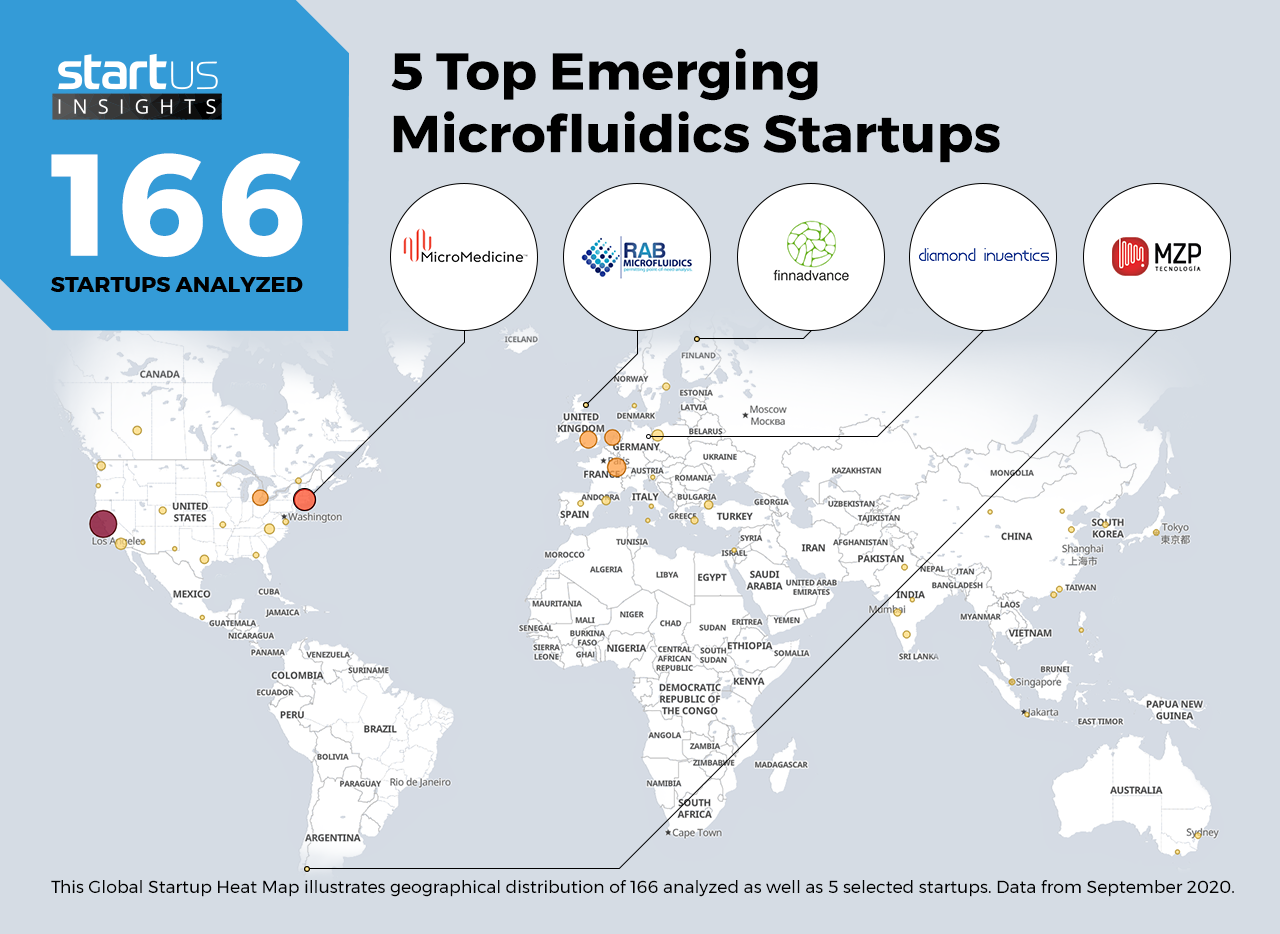Accelerate Productivity in 2025
Reignite Growth Despite the Global Slowdown
Our Innovation Analysts recently looked into emerging technologies and up-and-coming startups working on solutions for the biotechnology sector. As there is a large number of startups working on a wide variety of solutions, we want to share our insights with you. This time, we are taking a look at 5 promising microfluidics startups.
Heat Map: 5 Top Microfluidics Startups
Using our StartUs Insights Discovery Platform, covering 1.379.000+ startups & scaleups globally, we looked at innovation in the field of biotechnology. For this research, we identified 166 relevant solutions and picked 5 to showcase below. These companies were chosen based on a data-driven startup scouting approach, taking into account factors such as location, founding year, and relevance of technology, among others. Depending on your specific criteria, the top picks might look entirely different.
The Global Startup Heat Map below highlights 5 startups & scaleups developing innovative microfluidics solutions. Moreover, the Heat Map reveals regions that observe a high startup activity and illustrates the geographic distribution of all 166 companies we analyzed for this specific topic.
MZP Technologia – Clinical Diagnostics
Clinical diagnostic testing in its current form presents various challenges from lots of unnecessary testing to requiring numerous clinical testing equipment. Microfluidics allows pharma R&D teams to develop integrated clinical testing solutions in a single, micro-sized platform. Since such microfabrication solutions offer wide-ranging benefits beyond testing, several emerging startups are working on micro and nanotechnologies for the life sciences sector.
Argentine startup MZP Technologia combines microtechnology and embedded systems to build portable devices that manipulate small samples of fluids. The startup’s micro viscometer utilizes microfluidic chips using glass-glass, glass-silicon, or glass-polymer material combinations. This allows MZP to obtain different levels of optical transparency and hydrophobicity. The embedded system commands the sensors installed on the platform, records, and processes the data, and also provides remote synchronization with a database.
RAB Microfluidics – Lab-On-A-Chip
The diversification of products made from crude oil has given rise to industrial tribologists aiming to implement industry 4.0 concepts. Oil analysis (OA) is a routine performance indicator for conducting predictive maintenance. Since microfabrication technologies allow for comprehensive and rapid analysis, startups are developing lab-on-a-chip solutions that make it easier for tribologists to better understand their products.
RAB Microfluidics is a UK-based startup developing microfluidic technology for oil applications. The startup’s Microfluidic ATOM is a lab-on-a-chip solution providing point-of-need analysis. The solution eliminates the need to send and wait for lab reports, allows for real-time continuous monitoring, and also lowers costs. By providing a rapid analysis of oil data, Microfluidic ATOM allows for the predictive maintenance of machinery.
Diamond Inventics – Fiber-Based Microfluidics
One advancement in the field of microfluidic technology is using fibers as replacements for traditional silicon chips. Fibers enable microfluidics companies to work with different fluidic pathways, such as crosses and stars, moving past rectangular shapes. This flexibility allows clinical researchers to separate various elements of fluid more effectively and also enables them to conduct multiple analyses simultaneously.
German startup Diamond Inventics focuses on clinical testing solutions for Legionella using fiber-based microfluidics. The startup offers YaraLeg, a capillary-based fluid movement technology platform that instantly detects Legionella in its persistent state. The solution determines all Legionella cells in a volume unit, unlike traditional methods that measure colony-forming units (CFU). YaraLeg is a test-chip-on-paper that provides all the required analysis based on conventional filter paper. This test also allows for detecting bacteria with specific antibodies using enzyme-linked immunosorbent assays (ELISA).
Finnadvance – Organ-On-A-Chip
Advances in microfluidic technology further open up opportunities for pharma R&D teams to conduct human-like clinical trials for drug development. The technology extends further into hospitals for clinical diagnostic testing to help physicians prescribe the most effective treatment. A major application of microfluidics in clinical studies includes the development of organ-on-a-chip solutions that mimic non-performing systems in the body to activate the correct responses.
Finnish startup Finnadvance manufactures multi-channel 3D microfluidic organ-on-a-chip systems that simulate the activities, mechanics, and physiological response of entire organs and organ systems. Finnadvance’s microfluidic approach enables replicating precise biomechanical stimuli in-vitro, with precise control of flow velocities and 3D extra-cellular matrix (ECM) stiffness. The startup provides pharma R&D teams with in-vitro testing devices that are also compatible with microscopic imaging systems.
MicroMedicine – Automated Microfluidic Technology
Stem cells and other cell therapy solutions require the precise separation and isolation of target cells. Microfluidic platforms allow for easier and faster cell separation and isolation by employing, among others, techniques such as biomimetics, gravity and sedimentation, and optical sorting. However, these techniques are usually performed manually and take up considerable time. This prompts startups to develop automation solutions for cell isolation.
The US-based startup MicroMedicine offers Sorterra, a system for cell isolation. Sorterra is an automated microfluidic technology that rapidly processes millions of cells simultaneously and isolates target cells. The cells travel through microfluidic channels and are separated based on their response to pressure. This process results in a high yield of functional target cells. Further, researchers only spend a small amount of time to prepare Sorterra and also receive results with a quick turnaround.
What About The Other 161 Solutions?
While we believe data is key to creating insights it can be easy to be overwhelmed by it. Our ambition is to create a comprehensive overview and provide actionable innovation intelligence and enable you to achieve your goals faster. The 5 microfluidics startups showcased above are promising examples out of 166 we analyzed for this article. To identify the most relevant solutions based on your specific criteria, get in touch.








